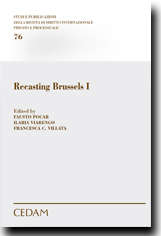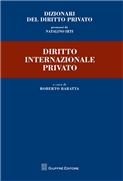Book: Pocar – Viarengo – Villata (Eds.), Recasting Brussels I
 The Italian publishing house CEDAM has published a new volume on the review of the Brussels I regulation: “Recasting Brussels I“. The book, edited by Fausto Pocar, Ilaria Viarengo and Francesca Clara Villata (all from the Univ. of Milan) includes twenty-five papers divided into five parts, devoted to the scope of application (I), rules on jurisdiction (II), choice-of-court agreements (III), coordination of proceedings (IV) and recognition and enforcement of judgments (V).
The Italian publishing house CEDAM has published a new volume on the review of the Brussels I regulation: “Recasting Brussels I“. The book, edited by Fausto Pocar, Ilaria Viarengo and Francesca Clara Villata (all from the Univ. of Milan) includes twenty-five papers divided into five parts, devoted to the scope of application (I), rules on jurisdiction (II), choice-of-court agreements (III), coordination of proceedings (IV) and recognition and enforcement of judgments (V).
Here’s the table of contents (.pdf file):
PART I – SCOPE OF APPLICATION
- Rainer Hausmann, The Scope of Application of the Brussels I Regulation;
- Ilaria Viarengo, The Removal of Maintenance Obligations from the Scope of Brussels I;
- Claudio Consolo – Marcello Stella, Brussels I Regulation Amendment Proposals and Arbitration;
- Peter Kindler, Torpedo Actions and the Interface between Brussels I and International Commercial Arbitration;
- Stefano Azzali – Michela De Santis, Impact of the Commission’s Proposal to Revise Brussels I Regulation on Arbitration Proceedings Administered by the Chamber of Arbitration of Milan.
PART II – RULES ON JURISDICTION
- Burkhard Hess, The Proposed Recast of the Brussels I Regulation: Rules on Jurisdiction;
- Riccardo Luzzatto, On the Proposed Application of Jurisdictional Criteria of Brussels I Regulation to Non-Domiciled Defendants;
- Fausto Pocar, A Partial Recast: Has the Lugano Convention Been Forgotten?;
- Alexander R. Markus, Harmonisation of the EU Rules of Jurisdiction Regarding Defendants Outside the EU. What About the Lugano Countries?;
- Ruggiero Cafari Panico, Forum necessitatis. Judicial Discretion in the Exercise of Jurisdiction;
- Marco Ricolfi, The Recasting of Brussels I Regulation from an Intellectual Property Lawyer’s Perspective;
- Eva Lein, Jurisdiction and Applicable Law in Cross-Border Mass Litigation;
- Zeno Crespi Reghizzi, A New Special Forum for Disputes Concerning Rights in Rem over Movable Assets: Some Remarks on Article 5(3) of the Commission’s Proposal.
PART III – CHOICE-OF-COURT AGREEMENTS
- Ilaria Queirolo, Prorogation of Jurisdiction in the Proposal for a Recast of the Brussels I Regulation;
- Christian Kohler, Agreements Conferring Jurisdiction on Courts of Third States;
- Francesca C. Villata, Choice-of-Court Agreements in Favour of Third States’ Jurisdiction in Light of the Suggestions by Members of the European Parliament.
PART IV – COORDINATION OF PROCEEDINGS
- Luigi Fumagalli, Lis Alibi Pendens. The Rules on Parallel Proceedings in the Reform of the Brussels I Regulation;
- Pietro Franzina, Successive Proceedings over the Same Cause of Action: A Plea for a New Rule on Dismissals for Lack of Jurisdiction;
- Lidia Sandrini, Coordination of Substantive and Interim Proceedings;
- Cristina M. Mariottini, The Proposed Recast of the Brussels I Regulation and Forum Non Conveniens in the European Union Judicial Area.
PART V – RECOGNITION AND ENFORCEMENT OF JUDGMENTS
- Sergio M. Carbone, What About the Recognition of Third States’ Foreign Judgments?;
- Thomas Pfeiffer, Recast of the Brussels I Regulation: The abolition of Exequatur;
- Stefania Bariatti, Recognition and Enforcement in the EU of Judicial Decisions Rendered upon Class Actions: The Case of U.S. and Dutch Judgments and Settlements;
- Manlio Frigo, Recognition and Enforcement of Judgments on Matters Relating to Personality Rights and the Recast Proposal of the Brussels I Regulation;
- Marco De Cristofaro, The Abolition of Exequatur Proceedings: Speeding up the Free Movement of Judgments while Preserving the Rights of the Defense.
– – –
Title: Recasting Brussels I, edited by F. Pocar, I. Viarengo and F.C. Villata, CEDAM (Series: Studi e pubblicazioni della Rivista di diritto internazionale privato e processuale – Volume 76), Padova, 2012, XXIV – 382 pages.
ISBN 9788813314699. Price: EUR 32,50. Available at CEDAM.
(Many thanks to Prof. Francesca Villata for the tip-off)

